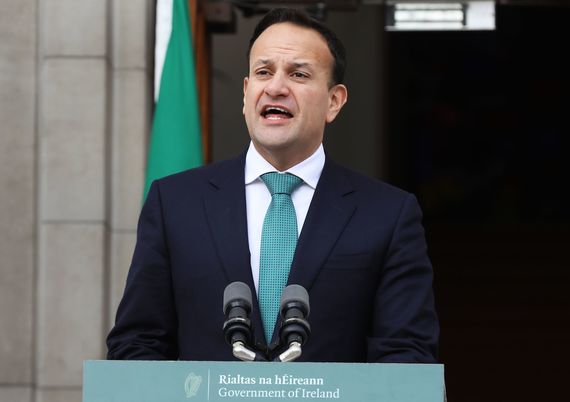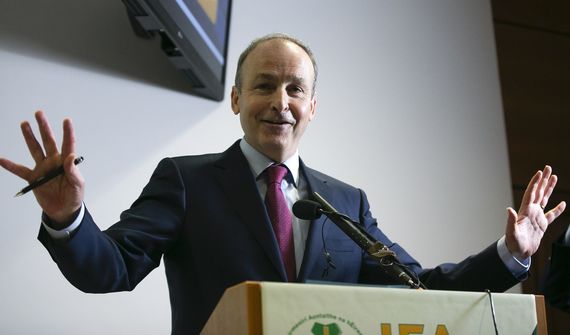Sinn Féin has surged ahead in the public polls days before Ireland's general election but what are the reasons for Fine Gael and Fianna Fáil's skepticism in going into government with the republican party.
We're now in the final days of the three-week election campaign here and I have yet to hear anyone in Sinn Fein using the republican slogan Tiocfaidh Ar La (Our Day Will Come). That might seem strange since some of them (hello, Mary Lou) like to use it now and then, particularly when addressing the faithful.
If the opinion polls are right it looks like Sinn Fein's day has come at last in the south -- they are now ahead of Fine Gael and level with Fianna Fail. Yet there has not been a Tiocfaidh Ar La to be heard from any of them during the campaign.
But it's not that strange really because the phrase has strong IRA resonance, and the last thing Sinn Fein wants to do at this stage is scare-off the middle-class voters who abhor violence. Especially bloody Irish Republican Army violence.
Read more: Tipperary general elections delayed as candidate passes away suddenly
So it's vital for Sinn Fein as election day approaches (voting is this Saturday, February 8) that all their candidates are Tiocfaidh-free and no one says anything that might draw attention to the IRA's murderous past. An uncomfortably recent past, it must be said.
And that raises the big question that faces not just political leaders here but voters as well. Is now the time when Sinn Fein should be accepted into the political mainstream in the south, treated like any other party and considered a suitable candidate for government?
The leaders of both Fine Gael and Fianna Fail are reluctant to do so, although Fine Gael leader and Taoiseach Leo Varadkar has been wavering a bit. In contrast, Fianna Fail leader Micheal Martin has been absolutely adamant throughout the campaign that he won't go into government with Sinn Fein, even though some of his party members have been making more accommodating noises in the last few days.

Fine Gael leader and Taoiseach Leo Varadkar.
There are two ways of looking at this. You can take the view that the Good Friday Agreement and the end of the IRA campaign mean that Sinn Fein now deserves to be treated the same as any other party here. Peace was made in the North, a power-sharing administration was formed, deadly foes like Ian Paisley and Martin McGuinness were able to work together and even become friends.
Sinn Fein has been accepted as a legitimate party in the North, suitable for government, and they must be accepted in the south in the same way. To refuse to do so at this stage is ridiculous, not least because they are now joint leaders in the opinion polls.
Read more: Historic poll results sees Sinn Féin surge ahead
The other view is that it's much too soon. It's only 20 years since the Good Friday Agreement came into effect and only 15 years since the IRA formally announced the end of its bloody campaign.
It's so recent that many of the senior people in the IRA are still there and still have direct control of -- or at the very least substantial influence over -- what they regard as the republican movement's political wing. That makes Sinn Fein different and raises serious doubts about whether it functions as a normal democratic party.

Making big promises: Sinn Fein on the campaign trail.
Of course, Sinn Fein leader Mary Lou McDonald dismisses this as nonsense and insists there are no "shadowy figures" in the background pulling her strings. It's so ludicrous, according to her, she makes jokes about it. Gerry Adams was at it last week as well -- he has a twisted ankle in a cast at the moment and when reporters asked him what had happened he blamed "shadowy figures.”
Gerry is dead funny, in several ways. Behind the gallows humor, however, the Sinn Fein reality is less clear than McDonald claims.
Martin -- and many other people here -- believe that Sinn Fein is controlled by a small group of senior IRA men (most of them from the Army Council) who dictate policy. The party is organized along Marxist centralist lines, with decisions taken at the top and then disseminated down through the ranks.

Fianna Fáil leader Micheál Martin.
Everything is controlled from above. Discipline is tight, as we know from the Sinn Fein local politicians who tried to do their own thing and were bullied out of the party.
There have been numerous examples of how this rigid control works at all levels in the party. One of the most telling at senior level was the revelation over a year ago at the “cash for ash” inquiry in the North that before taking decisions, Sinn Fein ministers in the Executive were seeking permission from outside "advisors" who were either themselves senior IRA figures or directly linked to them. This was going on when critical decisions were being taken on the handling of the cash for ash scandal.
Sinn Fein has tried to dismiss this as the normal "consultation" with advisors that ministers and political parties often do when making important decisions. But no one here is buying that. In effect, it meant that senior IRA figures were dictating to Sinn Fein ministers in the North what they should do in government.
The question is, do we want the same thing to happen here?
The argument that because Sinn Fein is part of the government in the North means they must be accepted into government in the south is flawed and facile. The need to establish peace and a power-sharing administration in the North meant that the situation there was -- and is -- completely different. There is no comparable and compelling necessity here to include Sinn Fein in government.
Beyond these fundamental points, there are wider considerations. The most basic, as Martin has pointed out, is the refusal by Sinn Fein to accept that any aspect of the IRA campaign was criminal or unjustifiable -- the beatings and knee-cappings used to keep communities in line, the proxy bombings, the careless murder of so many civilians including children, the extreme brutality and cruelty (remember Jean McConville) of the bloody campaign that went on over three decades. Most of this was in the North, of course, but in the south there were many examples, like the murder of Detective Garda Jerry McCabe when an IRA gang ambushed a cash in transit van.

One of the disappeared, Jean McConville.
In the last few years -- and in the run-up to this election -- there has been a concerted effort by Sinn Fein to rewrite this history, to position the recent IRA campaign as a legitimate part of a much longer story going back to the foundation of the state and partition. This is rejected by all the parties here, including Fianna Fail and Fine Gael who both grew out of the original Sinn Fein a century ago.
Whatever about in the North, in the south the recent IRA campaign has always been regarded as illegitimate and unjustifiable. And Sinn Fein's refusal to accept this puts their democratic credentials in doubt.
Further doubt is raised by their unconvincing attitude to the former IRA operatives who, after the peace settlement, graduated full time into ordinary crime and still use fear and terror to maintain a grip on their areas. This has continued years after the Good Friday Agreement, one notorious example being the savage murder of 21-year-old Paul Quinn from Monaghan in 2007 over a disagreement he had with the son of a local IRA leader.
Quinn was lured to a shed in the countryside where he was set upon by a gang of around 10 IRA-linked thugs wielding iron bars and nail-studded bats. Not only did they kill him but they broke every bone in his body.
No one has been convicted of his death, and instead of outing those responsible Sinn Fein tried to blacken Quinn's reputation by claiming he was involved in local criminality. This is typical of how Sinn Fein deals with such incidents -- it confuses and equivocates and denies any knowledge or responsibility.
Nor is there any sign that this attitude is changing, even under the more acceptable face of McDonald. Martin pointed out last weekend that the example of Sinn Fein's Deirdre Hargey proves this.
Hargey was in Magennis's bar in Belfast in 2005 on the night Robert McCartney was murdered after disrespecting an IRA leader. He was beaten and stabbed to death outside the bar but none of the dozens of Sinn Fein/IRA people there, including Hargey, saw anything, heard anything or knew anything.
McCartney's murder, like that of Quinn, remains unsolved. And now McDonald has overseen Hargey's appointment as communities minister (!) in the new administration in the North. Or maybe she was told to appoint her by the "shadowy figures" in Belfast she jokes about?
It is this lack of any contrition or even sensitivity that makes Sinn Fein unsuitable for government in the south, Martin says, and he believes that most people here agree with him. It's a damning indictment of Sinn Fein by the leader of Fianna Fail which has always called itself "the Republican Party.”
There are also security concerns. The "shadowy figures" in the background must be salivating at the prospect of Sinn Fein ministers at the Cabinet table here when crime, justice, security threats and intelligence matters are being discussed.
Despite all this, however, there is Sinn Fein's standing in the opinion polls. If repeated in the election, can that legitimize their involvement in the next government here?
The fact is that their current level of support is completely due to dissatisfaction among some voters about economic issues, about housing, health and the cost of living. These frustrated voters want real change, a change away from the two big parties, Fianna Fail and Fine Gael, which have run the country since the foundation of the state.
Such is the level of frustration here now that these voters are ignoring all political doubts about Sinn Fein and are swallowing their populist economic policies whole -- a bonanza of promises that would drive out investment and bankrupt the country.
Leaving aside their far-left policies on the economy, Sinn Fein still has a long way to go to acceptability. Of course, at some stage in the future, they will have to become part of mainstream politics here and even part of the government if their support warrants it. It could even happen after this election, despite what the two big parties are saying.
But it would be a lot easier after another few decades when a generation has passed and the "shadowy figures" still around are no longer in the background.
Read more: Derry woman takes Irish citizenship battle to the US




Comments